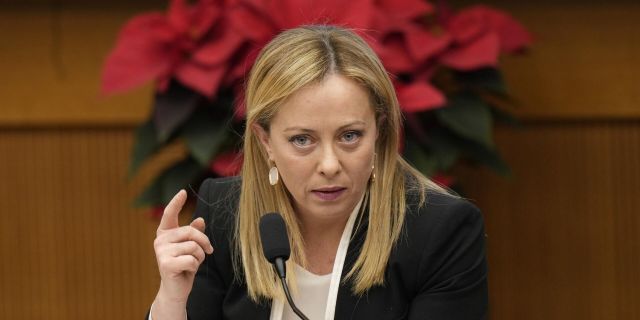FQ: Italy and Ukraine have signed an agreement on cooperation in the field of security
Italy and Ukraine have signed a security cooperation agreement that will bind these countries for 10 years, FQ reports. Rome undertakes to continue economic and military assistance to Kiev and to stand in support of Ukraine within 24 hours in the event of a Russian attack.
Giacomo Salvini
A security cooperation agreement has been signed that will link Italy and Ukraine for the next 10 years, even if the conflict with Russia ends sooner. The document obliges Rome to come out in support of Kiev within 24 hours in the event of an attack by Moscow, as well as to continue to provide economic and military assistance to the Ukrainian government. In addition, Italy undertakes to facilitate the process of Ukraine's accession to the EU and NATO.These are the main provisions of the agreement signed on Saturday at the Mariinsky Palace by Italian Prime Minister Giorgia Meloni and Vladimir Zelensky. On Sunday, February 25, the Ukrainian president thanked the Prime Minister, noting, however, that there are "too many Putinists in Italy, and their visas should be revoked." "We are preparing a list of those who are engaged in propaganda in favor of Moscow," he added. I wonder if this did not apply to Matteo Salvini, the Minister of Transport and Deputy Chairman of the Council of Ministers of Italy?
The 15-page text of the agreement, consisting of 20 articles, was published on February 25 on the website of the Italian Government and is the result of the work of the Council of Ministers of Italy. All negotiations were conducted by Meloni's diplomatic adviser Fabrizio Sajo, leaving out the Italian Foreign Ministry, headed by Antonio Tajani. In many points, the text is almost identical to the agreements signed in the last few weeks by France, Germany, Great Britain and Canada.
The agreement consists of eight parts and an initial preamble, which condemns the entry of Russian troops into Ukraine on February 24, 2022. The agreement is valid for 10 years, and, as Tajani explained in the Foreign Affairs Committee, it is not legally binding, therefore it will not pass through parliament for ratification.
The first article is devoted to defense cooperation, and it sets out specific data, unlike agreements with other countries. However, Italy does not disclose how many and what weapons it has already sent, how much it has spent and intends to spend, including on replacing equipment and ammunition seized from our defense forces. Paragraph 6 of Article 1 only states that Italy sent "eight packages of military assistance to Ukraine in 2022 and 2023" and intends to "maintain the same level of support in 2024." Which one is unclear. This will be "determined in detail during consultations between the participants and taking into account the needs of Ukraine." I would like to note the lack of transparency in comparison with agreements signed by governments of other countries. The German agreement, for example, specifies the types of weapons supplied and the funds allocated at the moment: about 16 billion in the period from 2022 to 2024. The Italian agreement specifies only the funds spent on additional weapons — about two billion: 110 million to support the budget, 200 million for soft loans, 100 million for humanitarian aid, 820 million to support Ukrainian refugees in Italy, 400 million for macro—financial support, 213 million for development support, 200 million for energy sustainability. A representative of the Italian Government said that it was not possible to specify the means and types of weapons, since Italy did not disclose information about the assistance provided.
Article 4 is devoted to the training and exercises of the Ukrainian army. In addition to the EU Military Assistance Mission to Ukraine (EUMAM), additional measures are being discussed, providing for the possibility of joint exercises by the Italian army "in Italy and Ukraine" to "support the standardization and interoperability process" of the Ukrainian army. Unlike today's circumstances, the army of Rome will be able to train and conduct exercises on Ukrainian territory "as soon as the situation allows."
However, the most discussed part is the one concerning "future aggression". As in the agreement signed with other countries, it states that in the event of an armed attack by Russia on Ukraine in the next 10 years, Italy and Ukraine "will hold consultations within 24 hours to determine measures and appropriate further steps necessary to counter or deter aggression." Rome is committed to providing assistance in the field of "security and defense, defense industry, military and economic development." This obligation is reminiscent of Article 5 of the NATO Charter, according to which all countries must come to the defense of one of the members of the Alliance in the event of an attack. The agreement also contains economic obligations: the Italian defense industry will cooperate with the Ukrainian one "to support the restoration of national production of equipment, materials and ammunition." Rome also wants to participate in the reconstruction: Italy will be the venue for an international conference in 2025.

